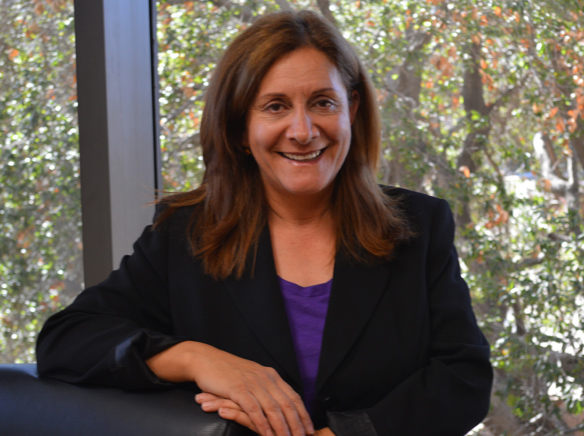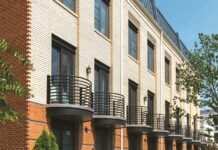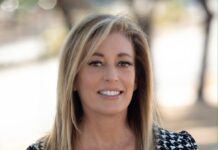“The happiest year of my life was 1979. I finally had the opportunity to come to the United States. My dad was sending us over here one at a time. My two brothers were here already and then my sister and me came along,” said Star Bales, El Cajon councilmember.
“The happiest year of my life was 1979. I finally had the opportunity to come to the United States. My dad was sending us over here one at a time. My two brothers were here already and then my sister and me came along,” said Star Bales, El Cajon councilmember.
“I can’t tell you the feelings that I had when the pilot announced we were flying over the United States,” she said. “It is a feeling I will never forget. I had two traveling bags. I felt like I had nothing crammed in those bags but my hopes and dreams that I had accumulated growing up in a country where I did not have the hope or confidence to bring any of those dreams about. There was not enough opportunity and not enough freedom. I have been very happy since my feet first landed and America always surprises me.”
Born in Iraq in a minority Christian family, Bales said as an adult she could see just how great her parents were for her mental and physical health and credited them for where she is today.
“I remember that my dad always wanted to come to America. He always dreamed about it,” she said. “I grew up believing there was a better place, because why would my dad dream of taking us somewhere else?”
Bale’s parents made it to America, but after a very hard life. Forcefully separated during the time of Saddam Hussein, her father was restricted to travel because they found out he was sending his family to America one by one.
“They warned my father and did not allow him to travel, so he stayed in Iraq for nine years before he was able to come over,” said Bales. “But when he came here he said he felt like he was the winner, because all of his family was safe. That’s all that mattered to him.”
Bales said her parents immersed her in education, giving lectures at home to teach her the things the schools would not. She finished high school, but it was not easy.
“How can you like school when there are no laws to keep the teachers from beating up the students for the littlest thing?” she said. “What do you learn? You learn what you are taught at home. But I was good, I listened, did my homework but could not understand how a culture could do this to children.”
Classes were segregated and she never knew what the boys were learning.
“But I was a tomboy,” she said. “I was always out and about. I went where no one else would go. I liked to know what the boys think, what they talked about and wanted to share my thoughts as they shared theirs. It was unusual and I got in trouble, but I always knew I wasn’t doing anything wrong and I could handle the trouble for the sake of my passion and for my freedom. No one can take that away from me.”
Bales said she values education and believes education starts with the family. Education has to be strong because it helps determine who you are, she said. Upon arrival in America, she went to school, learned English and continued her education. She married, had two children, but said in the back of her mind, even today, she still yearns for higher education.
“Part of me does not want to let go of learning more and more,” she said. “Every time you take a class, no matter what the subject is, you learn something new.”
And learn she did. Her father saw very early in life that she had a passion for art, but Bales said in Iraq, there are not many artists and to tell someone that is what you do is “telling them you are a nobody.”
“That is how they perceive artists,” she said. “Very few people would encourage the arts. As a culture, the majority, that is how they think. But not my dad and not my mom. I remember being young and my father came home calling my name. He handed me a bag. There were paint and brushes in there. For me, it was the best toy you could give a child. I realized how far he had to go to get them. It took him hours of travel.”
But, she said that was a seed that only grew once she reached America. She said finding people with the same passion was life altering and she became a member of many different art organizations, absorbing everything she could and putting it to practice. All these resources made her more passionate about art, she said, and it took a lot of time and she wondered if it was just for her or something bigger.
“It was what I wanted in life,” she said. “I did everything. Cubanism, expressionism, lots of realism, collages and experimented in all of them. But then I started to think outside the box.”
Quite by accident one day, she found when she pressed two flat surfaces together with paint in between, she got vein, tree branch looking images. She immediately saw it was something new and that it somehow had to do with science. Arts and science go together, she said. For years, she worked at enhancing it, making it come to focus by figuring out how to manipulate it.
“I call my art constructuralism art, it is a new art where you can use anything to create it,” she said. “It is based on the principles of design in nature and construction.”
With so much interest from peers, mentors and the children she volunteered to help with art in schools, she entered her work in the Del Mar Fair, with huge success.
Bales said that motivated her more, and she still felt that there was a connection between her art and science. She said she heard about a scientist from Duke University whose passion was much like hers, trying to figure out the mystery of the shape of things in nature and life, like lightning, trees, or lungs. She said she felt his passion for learning like her, so one day she picked up the phone and gave him a call.
Bales and Professor Adrian Bejan became good friends. Bales said that is what it is all about—how to connect with each other in a positive way. She said that they could feel the passion that each other had even though his was based in science and hers in art.
“He has passion, he works hard, is a kind person and when I first approached him, he treated me with respect and it all began because he took the time to take a phone call from an artist from El Cajon,” she said.
But art is just another slice of Bale’s life. In 2007, she worked for the U.S. Army as a linguist.
“That was the second happiest day of my life,” she said. “When I put on that uniform and looked into the mirror, I can’t describe the feelings in words. I was so proud and it was another monumental moment for me.”
Bales said that her past, art, years on the Art and Culture Commission and Planning Commission are strong tools that she brings to City Council. She said she can use her ability to connect with the community in many ways after living in El Cajon for more than 30 years. She said if you have heart, thoughtfulness for others, good dreams and hopes for everyone else, good things come your way.
“It’s America the beautiful,” she said. “How many artists connect with a scientist? Why can’t we? If we can make that grow, whether it is city matters, minorities, different cultures, it is wonderful and beautiful because now we have so many different colors and shapes of people. I think in El Cajon we have had it for years. All we need to do is build on it. I have always been very happy, satisfied living here. It is more complicated, but at the same time it is getting better. We have people that listen, care, and tolerate that there are differences. If we can continue to do this, we can be the greatest city in America.”
Bales said her experience through the Planning Commission, and the years before that with the Arts and Culture Commission gave her a lot of time with city staff. Much of the work went to City Council and she believes it is a wise decision to pick somebody from the Planning Commission. Bales began working with the Planning Commission in 2008.
“If they have been there for years, then they have studied many issues in the city and what we are going through,” she said. “The Planning Commission sees it, tries to fix it and tries to make it better. I don’t think this will be hard for me, but it is new, I’ll take it day by day and do my homework. I’ll work hard and take my time so that when I make that decision, I don’t look back and regret it. My focus is on the positive and the good people of my city.”














You made some nice points
You made some nice points there. I looked on the internet for the issue and found most persons will agree with your site. http://demo.jexiste.ca/?a%5B%5D=%3Ca+href%3Dhttp%3A%2F%2F107.22.174.95%2FUserProfile%2Ftabid%2F42%2FUserID%2F141605%2Flanguage%2Fen-US%2FDefault.aspx%3ERvxadryl%3C%2Fa%3E
You made some nice points
You made some nice points there. I looked on the internet for the issue and found most persons will agree
with your site. http://demo.jexiste.ca/?a%5B%5D=%3Ca+href%3Dhttp%3A%2F%2F107.22.174.95%2FUserProfile%2Ftabid%2F42%2FUserID%2F141605%2Flanguage%2Fen-US%2FDefault.aspx%3ERvxadryl%3C%2Fa%3E